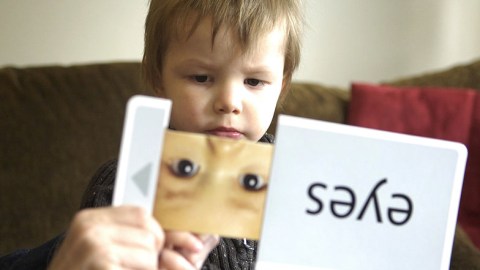Do People With Autism Experience Emotions?

Of the many stereotypes surrounding autism, one of the most persistent has been the notion of autistic people as emotionless, even slightly robotic. Partly to blame may be the enduring cultural influence of “Rain Man,” in which the Dustin Hoffman character, a walking collection of impenetrable tics, shows the first hint of an emotional breakthrough only at the end of the film. Real-life autism is more varied and complex, but is there any truth behind the popular image? What is the relationship, if any, between autism-spectrum disorders and emotional impairment?
In Part 4 of our Breakthroughs: Autism series, Dr. Susan Bookheimer, professor of cognitive neuroscience at UCLA, explains that there are no major superficial differences between the autistic and the non-autistic brain. Moreover, “individuals with autism certainly have emotions”—as “anyone who has a child with autism knows.” However, studies suggest that autistic children may have greater difficulty with “subtle emotions like shame, pride, things that are much more socially oriented”—and greater difficulty reading emotions in other people. The latter tendency may be related to neurological problems with facial processing; says Bookheimer, “We have an area of the brain that is pretty well devoted to face processing that becomes stronger and very, very well entrenched in the brain rather early in life; and individuals with autism, many of them, did not seem to show that same kind of specialization.”
Bookheimer is careful to note that the cause-and-effect relationship here is tricky to untangle. “There is a model that individuals with autism don’t seem to have the same almost innate motivation to socialize, and if you don’t socialize, then you won’t learn a lot of these social behaviors, including how to read other people.” But which comes first, the difficulty in socializing or the lack of motivation for it? The starting point of this apparent vicious cycle will require considerable further study to pin down.
In addition to identifying and understanding the emotions of others, autistic people may have a harder time processing and understanding their own. According to Bookheimer, “the amygdala, an area of the brain that is involved in the experiencing of strong and salient emotions, doesn’t always react in the same way, and isn’t as well regulated or modulated as it is in typically developing individuals.” Rather than lacking emotion, it’s likely that autistic people struggle to “think through and work through” the emotions they experience.
As with so much about autism, the precise relationships among these difficulties—in relating to others’ emotions, in processing one’s own emotions, and in understanding socially oriented emotions specifically—is not fully understood. Bookheimer speculates that, through a “cascading effect,” slow initial development in social abilities may “evolve” into more severe problems in later childhood. But until the science itself evolves, we will have few definitive answers.
More Resources
—Child Psychology Research Blog article on high-functioning autistic children’s ability to understand emotions, particularly spoken emotions.
—Nature Neuroscience paper on mirror neuron dysfunction and problems with emotional understanding in autistic children.





